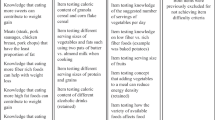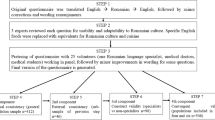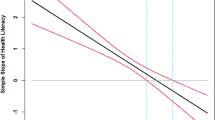Abstract
Background/Objectives:
As a high-quality diet is associated with a lower risk for several diseases and all-cause mortality, current nutrition education tools provide people with information regarding how to build a healthy and a balanced meal. To assess this basic nutrition knowledge, the research aim was to develop and validate a brief scale to measure the Practical Knowledge about Balanced meals (PKB-7).
Subjects/Methods:
A pool of 25 items was pretested with experts and laypeople before being tested on a random sample in Switzerland (n=517). For item selection, a Rasch model analysis was applied. The validity and reliability of the new scale were assessed by three additional studies including laypeople (n=597; n=145) and nutrition experts (n=59).
Results:
The final scale consists of seven multiple-choice items, which met the assumptions of the Rasch model. The validity of the new scale was shown by several aspects: the Rasch model was replicated in a second study, and nutrition experts achieved significantly higher scores than laypeople (t(148)=20.27, P<0.001, d=1.78). In addition, the PKB-7 scale was correlated with other nutrition-related constructs and associated with reported vegetable consumption. Test–retest reliability (r=0.68, P<0.001) was acceptable.
Conclusions:
The PKB-7 scale is a reliable and a valid Rasch-based instrument in Swiss citizens aged between 18 and 80 years for measuring the practical knowledge about balanced meals based on current dietary guidelines. This brief and easy-to-use scale is intended for application in both research and practice.
This is a preview of subscription content, access via your institution
Access options
Subscribe to this journal
Receive 12 print issues and online access
$259.00 per year
only $21.58 per issue
Buy this article
- Purchase on Springer Link
- Instant access to full article PDF
Prices may be subject to local taxes which are calculated during checkout
Similar content being viewed by others
References
Reedy J, Krebs-Smith SM, Miller PE, Liese AD, Kahle LL, Park Y et al. Higher diet quality is associated with decreased risk of all-cause, cardiovascular disease, and cancer mortality among older adults. J Nutr 2014; 144: 881–889.
Brambila-Macias J, Shankar B, Capacci S, Mazzocchi M, Perez-Cueto FJA, Verbeke W et al. Policy interventions to promote healthy eating: a review of what works, what does not, and what is promising. Food Nutr Bull 2011; 32: 365–375.
de Abreu D, Guessous I, Vaucher J, Preisig M, Waeber G, Vollenweider P et al. Low compliance with dietary recommendations for food intake among adults. Clin Nutr 2013; 32: 783–788.
Food and Agriculture Organization of the United Nations (FAO). Food-based dietary guidelines (http://www.fao.org/nutrition/nutrition-education/food-dietary-guidelines/en (accessed 17 March 2015).
Montagnese C, Santarpia L, Buonifacio M, Nardelli A, Caldara AR, Silvestri E et al. European food-based dietary guidelines: a comparison and update. Nutrition 2015; 31: 908–915.
Swiss Society for Nutrition. Ausgewogener Teller [balanced eating plate] (http://www.sge-ssn.ch/de/ich-und-du/essen-und-trinken/ausgewogen/ausgewogener-teller (accessed 17 January 2015).
Havard Health Publications. Healthy Eating Plate (http://www.hsph.harvard.edu/nutritionsource/healthy-eating-plate (accessed 17 March 2015).
Freeland-Graves JH, Nitzke S . Position of the Academy of Nutrition and Dietetics: total diet approach to healthy eating. J Acad Nutr Diet 2013; 113: 307–317.
Spronk I, Kullen C, Burdon C, O'Connor H . Relationship between nutrition knowledge and dietary intake. Br J Nutr 2014; 111: 1713–1726.
World Health Organisation. Health diet. Fact sheet N°394 (http://www.who.int/mediacentre/factsheets/fs394/en (accessed 17 March 2015).
Carbone ET, Zoellner JM . Nutrition and health literacy: a systematic review to inform nutrition research and practice. J Acad Nutr Diet 2012; 112: 254–265.
Rasch G . Probabilistic Models for Some Intelligence and Attainment Tests. Danish Institute for Educational Research: : Copenhagen, Denmark, 1960.
Embretson SE, Reise SP . Item Response Theory for Psychologists. L. Erlbaum Associates: Mahwah, NJ, USA, 2000.
Parmenter K, Wardle J . Evaluation and design of nutrition knowledge measures. J Nutr Educ 2000; 32: 269–277.
Boeing H, Bechthold A, Bub A, Ellinger S, Haller D, Kroke A et al. Critical review: vegetables and fruit in the prevention of chronic diseases. Eur J Nutr 2012; 51: 637–663.
Haladyna TM . . Developing and Validating Multiple-choice Test Items, 3rd edn. Lawrence Erlbaum Associates: New Jersey, USA, 2004.
Collins D . Pretesting survey instruments: an overview of cognitive methods. Qual Life Res 2003; 12: 229–238.
R Development Core Team R: A Language and Environment for Statistical Computing. R Foundation for Statistical Computing: : Vienna, Austria, 2014.
Mair P, Hatzinger R . Extended Rasch modeling: the eRm package for the application of IRT models in R. J Stat Softw 2007; 20: 1–20.
Bond TG, Fox CM . Applying the Rasch model: Fundamental measurement in the human sciences, 2nd edn, Lawrence Erlbaum Associates, Inc.: Mahwah, NJ, USA, 2007.
Koller I, Alexandrowicz R, Hatzinger R . Das Rasch Modell in der Praxis: eine Einführung in eRm [The Rasch Model in Practice: an Introduction to eRm]. UTB: : Wien, Austria, 2012.
Henson S, Blandon J, Cranfield J . Difficulty of healthy eating: A Rasch model approach. Soc Sci Med 2010; 70: 1574–1580.
Guttersrud Ø, Dalane JØ, Pettersen S . Improving measurement in nutrition literacy research using Rasch modelling: examining construct validity of stage-specific ‘critical nutrition literacy’scales. Public Health Nutr 2014; 17: 877–883.
IBM Corp IBM SPSSStatistics for Macintosh, Version 22.0. IBM Corp: Armonk, NY, USA. Released 2013.
Parmenter K, Wardle J . Development of a general nutrition knowledge questionnaire for adults. Eur J Clin Nutr 1999; 53: 298–308.
Dickson-Spillmann M, Siegrist M, Keller C . Development and validation of a short, consumer-oriented nutrition knowledge questionnaire. Appetite 2011; 56: 617–620.
Grunert KG, Wills J, Celemín LF, Lähteenmäki L, Scholderer J, Bonsmann SSg . Socio-demographic and attitudinal determinants of nutrition knowledge of food shoppers in six European countries. Food Qual Pref 2012; 26: 166–177.
Roininen K, Tuorila H, Zandstra EH, de Graaf C, Vehkalahti K, Stubenitsky K et al. Differences in health and taste attitudes and reported behaviour among Finnish, Dutch and British consumers: a cross-national validation of the Health and Taste Attitude Scales (HTAS). Appetite 2001; 37: 33–45.
EUFIC (European Food Information Council) review 01/2012. Fruit and vegetable consumption in Europe - do Europeans get enough? (http://www.eufic.org/article/en/expid/Fruit-vegetable-consumption-Europe (accessed 20 March 2015).
Hartmann C, Siegrist M, van der Horst K . Snack frequency: associations with healthy and unhealthy food choices. Public Health Nutr 2013; 16: 1487–1496.
Kline P . . The Handbook of Psychological Testing, 2nd edn. Routledge: London, UK, 2000.
Koller I, Lamm C . Item response model investigation of the (German) Interpersonal Reactivity Index Empathy Questionnaire: implications for analyses of group differences. Eur J Psychol Ass 2014; 1: 1–11.
Acknowledgements
The present research was funded by the Swiss National Science Foundation (Grant number: 406940_145143/1). We thank the Swiss Society for Nutrition (SSN) for their professional support during the item generation process and are grateful to all people who participated in our studies.
Author information
Authors and Affiliations
Corresponding author
Ethics declarations
Competing interests
The authors declare no conflict of interest.
Additional information
Supplementary Information accompanies this paper on European Journal of Clinical Nutrition website
Supplementary information
Rights and permissions
About this article
Cite this article
Mötteli, S., Barbey, J., Keller, C. et al. Measuring practical knowledge about balanced meals: development and validation of the brief PKB-7 scale. Eur J Clin Nutr 70, 505–510 (2016). https://doi.org/10.1038/ejcn.2015.173
Received:
Revised:
Accepted:
Published:
Issue Date:
DOI: https://doi.org/10.1038/ejcn.2015.173
This article is cited by
-
The nutrition for sport knowledge questionnaire (NSKQ): development and validation using classical test theory and Rasch analysis
Journal of the International Society of Sports Nutrition (2017)



